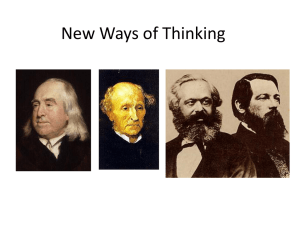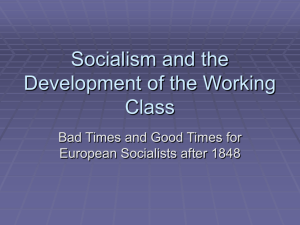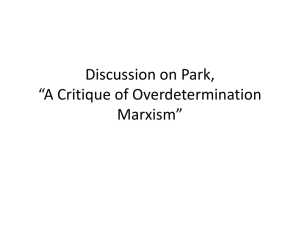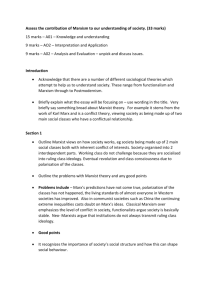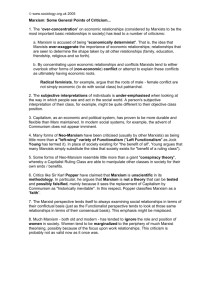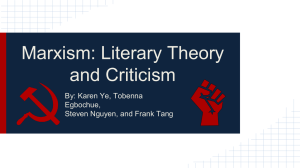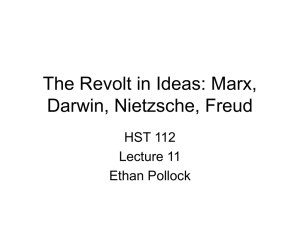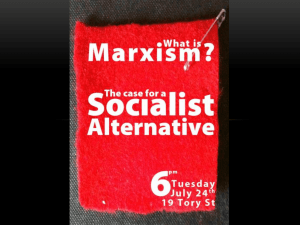Marxism/ Neo- Marxism
advertisement
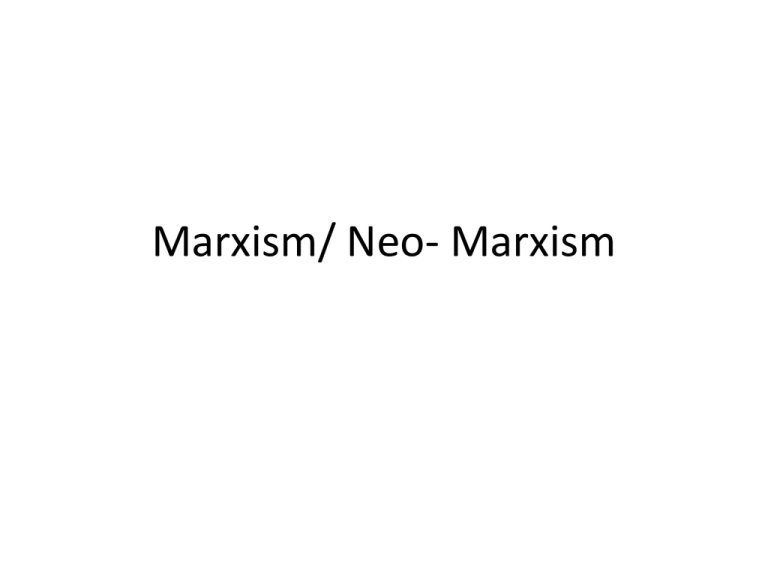
Marxism/ Neo- Marxism What is Marxism? • The concept of Marxism was developed by the German philosopher, economist and sociologist Karl Marx. He developed the concept based on his analysis of economic development during the Industrial Revolution of the mid 19th century. • In his Communist manifesto (1848), Marx was critical of the capitalist mode of production and the consequences for persons in such societies Central Concept of Marxism • The central concept of Marxism is the nature of capitalism and its exploitative effects A capitalist society is one in which large investment of capital is made by a small group of persons for the production of goods, with the aim of maximizing profit. Marx argues that the accumulation of this wealth comes from the exploitation of the masses (proletariat) The exploitation comes in the form of low wages far below the value of the goods produced for the proletariat while the capitalist obtains the difference between the wage and the value of the commodity (profits) Central Concept of Marxism Cont’d • Marx argued that the economic dominance of this small minority influences the political structure of these societies. Therefore the Government, schools, churches, judiciary as well as beliefs and values will reflect the ruling class (bourgeoisie) ideology. • Marx argued that a class struggle is the outcome in such societies and this struggle will transform the capitalist society into a communal or class- less society • This struggle is peaked by the process of alienation and the difference in relationship between both classes and the factors of production (land, labour, capital) Marxism in The Caribbean • Caribbean leaders such as Michael Manley, Forbes Burnham and Maurice Bishop of Jamaica, Guyana and Grenada respectively, were all influenced by Marxism/ NeoMarxism Democratic Socialism in Jamaica 1972 • Manley rose to power in Jamaica in 1972 against the backdrop of social unrest and widespread call for welfare reform. • Manley therefore developed a deep- seated commitment to social justice and equality because of the stark realities he faced as president of the National Worker’s Union (NWU), where he represented poor workers against wealthy employers • In keeping with the Marxist ideology that the masses should own the means of production, the Manley regime embarked upon a nationalization programme of owning majority of the shares in the electricity and telephone companies and transport system • He also imposed a 7.5% Bauxite Levy on all bauxite companies operating in the country in an effort to increase the revenue of the country. He passed legislations to protect the vulnerability of the society such as: The Family Court Act, Maternity Leave Act and the Minimum Wage Act Co-operate Socialism in Guyana • After independence from Britain (1966), the Linden Forbes Burnham regime adopted a socialist type of economic development • Burnham amended the constitution of 1966 to reflect the fundamental nature of Cooperative Socialism to the Guyanese people. • The principal objectives of the new political system was to extend socialist democracy such that citizens would participate in the management and decisionmaking process of the state • Burnham started a process of nationalization in sugar, bauxite and communication sectors, with the aim of redistributing wealth to the masses through social programmes such as health and education • However government’s lack of financial resources made it difficult to coordinate its activities and the increasing debt burden of Guyana during this period led to the government turning to the IMF Socialism in Grenada • The aim of Maurice Bishop and the New Jewel Movement (NJM) was to rid the country from colonial political thinking under the leadership of Eric Gairy • Bishop displayed selected socialist tendencies of nationalization of banks, transportation and the media • He sought to improve the conditions of work through progressive labour legislations, improvement in health as well as education • He joined alliances with Cuba and other countries in the far east. Under such alliances, the Cubans gave technical support in the building of the Pont Salines Airport in Grenada and the awarding of scholarships to Grenadians to study in Cuba • Unlike Jamaica and Guyana where the socialist experiment proved disastrous because of heavy debt burden, the Grenadian socialist experiment was short- lived because of internal conflict

